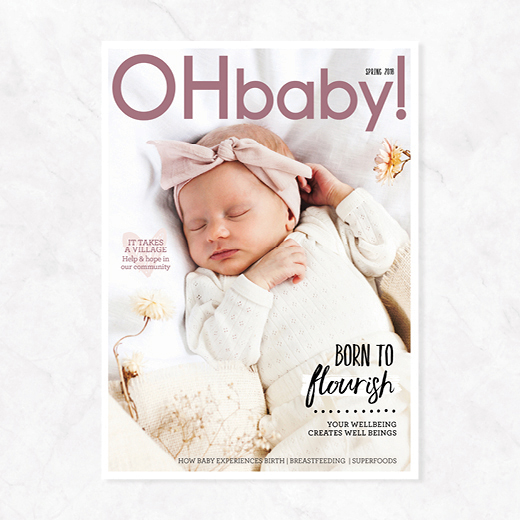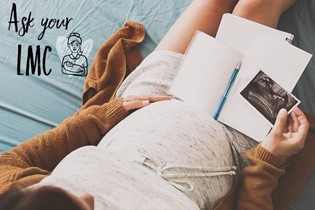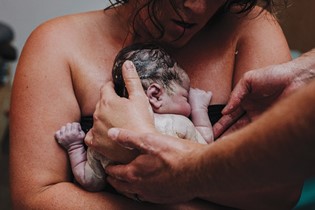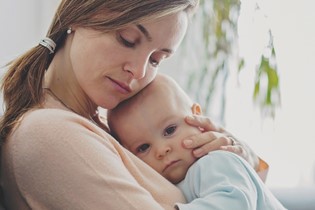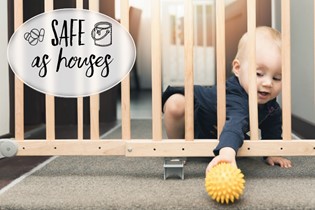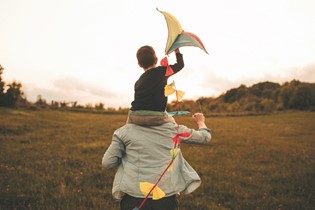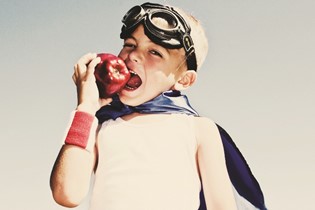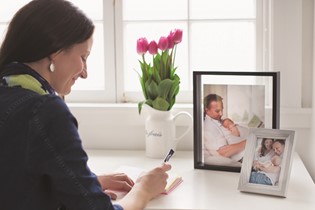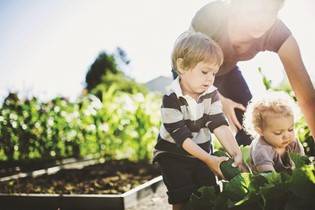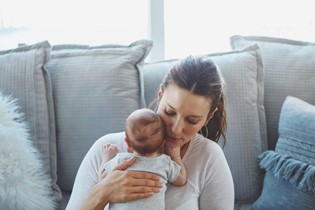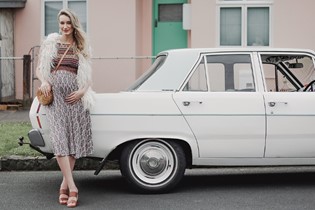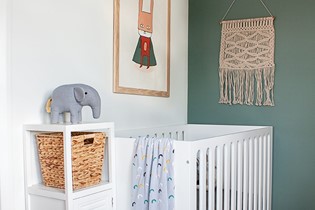The incredible first 24 hours of baby's life
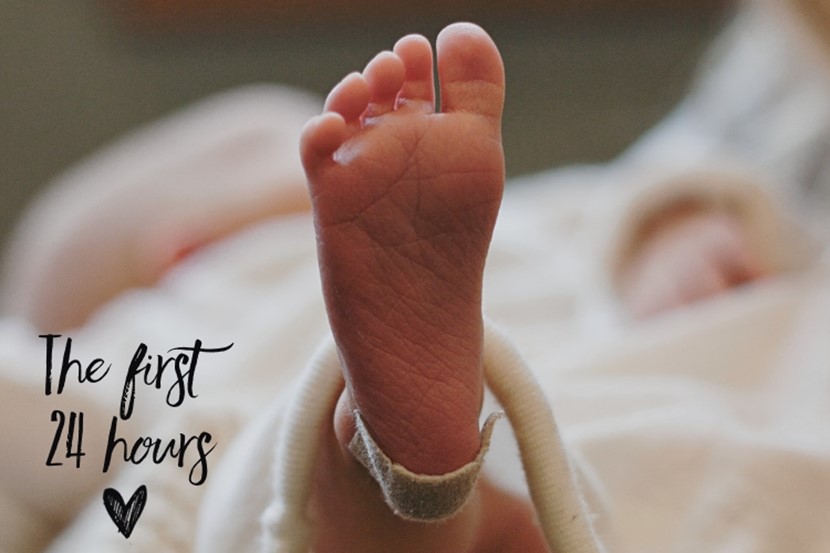
Midwife Abbe Cherry shares an overview of what to expect in the incredible first day in the life of your baby.
The first 24 hours after your baby is born is often a time of transition. It’s also a chance to catch your breath after labour, not to mention the tension of the previous months, anticipating what the day of your baby’s birth may have in store.
For your baby this is also a period of transition; from being a foetus inside your womb to being a newborn! She’ll be tired from the birth journey (whether it’s a fast or a slow birth) and will be recovering right alongside you.
THE IMPORTANCE OF SKIN-TO-SKIN CONTACT
When your baby is born, she will be lifted onto your chest, dried and then, hopefully, given uninterrupted skin-to-skin contact with you. Facilities and care providers are getting better at recognising the importance of early skin-to-skin contact and successful breastfeeding, and there is a plethora of research to support this view.
During your labour, your LMC would have been closely monitoring your baby and making assessments to ensure your baby’s safety. If there were any concerns, a paediatrician may have been invited to attend your birth, so they could be on hand if resuscitation was required. For some women, congenital abnormalities are discovered antenatally, and those women may have had a plan to have a paediatric team on hand at the birth as well.
Immediately following the birth, your LMC (or the paediatric team) will assess whether your baby needs any assistance. If so, she will be taken straight away to be checked, but returned for skin-to-skin contact as soon as possible. Unfortunately, there are sometimes situations when babies have to be taken to the Special Care Baby Unit (SCBU). At this time, partners will often be asked if they would like to come to the SCBU, however we try and reunite mums and babies as quickly as we can.

FEEDING TIME AND THE FIRST HOUR AFTER BIRTH
It is recommended that babies feed within the first hour of life. Your baby will often try to make her way to the breast instinctively (this is known as the ‘breast crawl’) once she receives skin-to- skin contact with you. In this first hour after the birth of your baby, your LMC will be busy with the final aspects of your birth: completing the third stage and aiding the delivery of your placenta, suturing and clearing up. This is an opportunity for you and your baby to get to know each other. Smell, vision and taste all help your baby to find the breast. Your voice and touch make her feel comfortable and help to create a suitable environment to connect.
After you’ve spent some time feeding and bonding with your baby, your LMC will do a full postnatal check, from top to toe. This usually includes:
✔ Measuring length, head circumference and weight
✔ Examining fontanelles (soft spots on your baby’s head)
✔ Listening to heart and lungs
✔ Checking hips
✔ Feeling for pulses in her legs
✔ Checking the cord for three vessels
✔ Checking the Moro and grasp reflexes
✔ Checking limbs, hands, fingers, feet and toes
✔ Checking eyes, and possibly the red eye reflex (RR).
A red eye reflex is a non-invasive test that involves shining a light into your baby’s eyes to see the reflection on the back of her eye. It can show early warning signs of serious eye conditions in children, and should be completed in the first 24 hours. Whether you wanted your baby to receive vitamin K (a vitamin that plays an important role in blood clotting) will have been discussed with you antenatally, and it would be at this baby-check time that we would give this, either orally or via an injection in your baby’s thigh, in accordance with your wishes.
If your LMC has any concerns after the baby check, she’ll refer you on to the appropriate services. Usually this is the paediatric team who will see your baby straight away if it is urgent, or the next day if you’re within the hospital setting.
|
APGAR SCORE ON ARRIVAL ✔ Appearance (skin colour) ✔ Pulse (heart rate) ✔ Grimace response (reflexes) ✔ Activity (muscle tone) ✔ Respiration (breathing rate and effort) The Apgar test is not designed to predict a baby’s long-term health, behaviour, intelligence or outcome. It is to help healthcare providers tell a newborn’s overall physical condition so they can quickly decide whether the baby needs immediate medical care or not. Most babies are born with an Apgar of nine at one minute, and then 10 by five minutes, losing a point for colour as their little feet are often slightly purple to begin with. |
TRANSFERRING FROM THE BIRTHING ROOM AND BABY'S ESSENTIAL CARE
You’ll spend approximately two hours in the delivery room before being transferred to a primary facility, the postnatal ward or home, depending on your preference and whether you need to be monitored. Some babies will need their temperature and respiratory rate checked before each feed. This is because they may have been exposed to things such as group B strep, a common vaginal bacteria that can cause infection in newborns, or to meconium (the first baby poo) during labour, or any other infection risk factors.
If you have diabetes, or if you developed gestational diabetes (GDM) during pregnancy, your baby may need serial blood glucose testing. This may also be suggested if your baby is either small for her gestational age (SGA), or large for her gestational age (LGA), ie above 4.5kg. Blood is taken from your baby’s foot and tested, usually bedside. This is commonly done within the first hour after birth, and then before each feed, until three normal results have been obtained.
Keeping your baby warm is also central to maintaining the wellbeing of your newborn. If your baby is cold, she has to use more energy to keep warm, and this could have a negative impact on her blood sugar levels. Direct skin-to- skin contact is often the best way to keep a baby warm, or to warm a cool baby. Have natural fibres ready to dress her in, such as cotton, wool or merino. Avoid polyesters as these can make babies sweat which can also make them cold. A warm hat will help too.
Your baby is often sleepy in the first 24 hours after the birth. Use this time to get as much rest as possible yourself. From the second night, most babies are hungry and want to feed every one to two hours to meet their nutritive needs and to help bring your milk in. It is important that your baby has access to unrestricted on-demand feeding.
When your baby sleeps, practise ‘safe sleeping’ by having her in her own bed, lying face up, with her face clear of any bedding, and preferably in a non-smoking environment.
If you are an inpatient in a hospital or a birthing unit, you may be offered a hearing screen for your baby in the first 24 hours. It is a simple and safe test, and most babies sleep through it. If your baby does not pass, try not to stress, it’s usually because of fluid remaining in the ear or from environmental factors, and the screening team will organise a repeat test.
Your baby will usually pass meconium and urine in the first 24 hours. The urine output can be small during this time, so if you’re unsure, putting a piece of tissue into baby’s nappy may help. Meconium is the first poo your baby will do. It is thick, blackish-green and very sticky. Some parents like to put a layer of natural oil, such as almond, onto their baby’s skin to help make cleaning easier.
BABY'S FIRST DIP
As midwives, we are often asked to bathe babies soon after they are born. However, we know that the vernix that covers your baby’s skin has an important role to play. One of the primary purposes of vernix is to protect your baby from unwanted pathogens, both in the womb, and out of it. Vernix also helps to insulate your baby and keep her warm. Accordingly, the World Health Organisation recommends you don’t bathe your baby for at least 48 hours. Bathing can usually wait until you return home, and it’s often something grandparents, dads or partners love to help with.
PACE YOURSELF
The first 24 hours is an incredible time for all concerned. Give yourself time to adjust to your new role, and try to rest and/or sleep when baby is sleeping, as it’s essential that you’re in a good physical and mental state to be able to cope with all the responsibilities a newborn baby entails. I recommend you only invite carefully selected friends and family to visit you, as this is a very special time for you, your partner and your new addition. Remember, there’ll be plenty of time for visitors in the weeks to come.
Abbe Cherry is an Auckland-based midwife and mother of three.

AS FEATURED IN ISSUE 43 OF OHbaby! MAGAZINE. CHECK OUT OTHER ARTICLES IN THIS ISSUE BELOW
